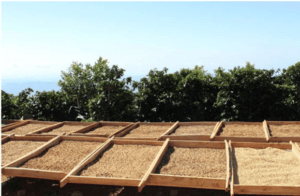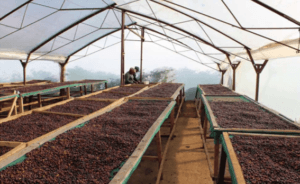Description
Located in ‘Mercedes Sur’, Turrubares / Puriscal (southwest of San José), this micro mill processing plant (‘Beneficio’) was designed, built and initiated operations in 2014 (Zona Central, Costa Rica)
This was done at the initiative of the Trejos and Di Tolla families who decided to invest in this family project. The Trejos’s son, Michael, is married to the Di Tolla’s daughter, Nicole, and they are currently responsible for the management and administration of the farm and the micro mill operation. Their first child, Gabriel, was born in 2013 and the ‘Beneficio’ is named in his honor.
The history of our coffee in the ‘Mercedes Sur’ region begins with the Trejos family, who are originally from this area and who have been cultivating different small coffee plots for more than 13 years.
The area has seen coffee crops developed at altitudes between 1.350 and 1.600meters above sea level and the coffee grown there enjoys a favorable climate for production of the highest quality. The size of the project is around 13 Hectares, planted with varieties including Caturra, Catuai, Geisha, Kenya, amid others. Coffee plant flowering is between March and May for this area. The production of this micro mill is a mix of washed, honey, semi-honey and natural coffee beans. The combination of sunny days, mixed with cloudiness and intermittent rains, complemented by relatively cold nights due to a prevailing breeze from the Pacific Ocean, results in an optimal plant growth and the development of a coffee bean with a very special profile, rich fruity fragrances and sweet caramel aromas, during the roasting process. Unquestionably, it is a ‘high quality’ coffee that delivers an excellent ‘Cup’ with special characteristics.
We believe that Anaerobic fermentation produces distinct acids, like lactic acids, that give the final product a striking flavor. During this process, coffee beans are placed in sealed tanks that are pressurized from CO2 buildup, and then remaining pressure and oxygen are let out using release valves (time varies depending on weather temperature, outside humidity, fruit ripening, type of coffee, etc. (It could be between 60 to 72 hours). This additional pressure forces the juices and sugars into the bean (that’s our theory, at least!). You can have anaerobic naturals, honeys, and washed coffees. The fermentation can take place in cherry or de-pulped in the mucilage. The coffee is then dried in cherry (natural), in mucilage (honey), or washed and dried.
Farm Information
-
Farm NameFinca Don Fernando
-
FarmerMichael Trejos Porras
-
Altitude1450
Score
-
Score86.54
Lot Information
-
Year2023
-
Processing SystemAnaerobic
-
VarietyGeisha
-
OverallComplex, Structured, Sweet,
-
Aroma / FlavorBasil, Basmati Rice, Berry, Boozy, Cacao Nibs, Caramel, Casis, Citrus Fruit, Clementine, Dried Fig, Jam, Lime skin, Malt, Milky, Mint, Nutty, Orange, Passion Fruit, Plum, Strawberry daquiri
-
AcidityCitric acidity , Black Currant, Citrus, Complex, Grape, Malic acidity, Tropical Fruit


